By RP Staff, on Mon Jan 30, 2012 at 10:30 AM ET Spectrum Gaming Group’s Market Analysis
[The RP’s Provocation, Artur Davis’s Rebuttal #1; Ron Granieri’s Rebuttal #2; Natasha Dow Schüll’s Analysis]
The RP referred in his Provocation to a recent market analysis sponsored by the Kentucky Chamber of Commerce, a pro-gaming organization. Below is an excerpt from the report, as well as a link to its Executive Summary:
Based upon our assumed parameters, we developed a detailed market analysis and casino project assumptions that were based on site visits, the competitive landscape, owner interviews and our experience. Spectrum concludes that the eight Kentucky casinos as described in this report would produce the following statewide outcomes (first-year numbers are assumed to be for 2015):
• First-year full-time equivalent direct jobs of as many as 10,953, with a payroll of $289.3 million.
• First-year statewide total direct, indirect and induced jobs of 20,471 (non-farm, but inclusive of equine). This excludes any government jobs that might be created.
• The eight prospective casinos would generate first-year gross state product of $1.737 billion and first-year total personal income of $1.009 billion.
• The 30-month construction period would create 4,297 full-time-equivalent construction jobs with a total payroll of $338 million.
• First-year gross gaming revenue of $1.14 billion. • First-year gaming tax of $464.7 million, and total state tax receipts from all sources of
$541.3 million, including funds dedicated to horse-racing industry programs. • One-time license fees of $266 million. • First-year funds for horse-industry programs of $164.6 million:
o $152.5 million for thoroughbred and standardbred purses o $10.5 million for the Equine Breed Authority o $1.6 million for Quarter Horse Purse Program
• Funds dedicated to the racing industry would generate an average of 2,861 additional jobs in the equine sector each year over the first three years of casino operations, with an estimated 1,500 jobs created in the first year.
Click here to read the full Executive Summary of the report.
By RP Nation, on Mon Jan 30, 2012 at 10:00 AM ET Natasha Dow Schüll: Analysis
[The RP’s Provocation, Artur Davis’s Rebuttal #1; Ron Granieri’s Rebuttal #2]
A RP Nation reader who opposes expanded gaming recommended the pioneering work of MIT Professor Natasha Schüll. An op-ed of Schüll’s from The Washington Post — written at the time that Maryland was considered expanded gaming — is excerpted below, and a link to her new book, Addiction by Design, is provided as well:
All forms of gambling are not created equal. Marylanders should take this into account when deciding how to vote in November’s referendum on slots.
My research as a social anthropologist has been focused on a dramatic turn that has taken place in recent decades from social forms of gambling played at tables to asocial forms played alone at video terminals. If voters endorse the proposal to alter Maryland’s constitution to allow slot machines at racetracks, residents will be exposed to devices that have been carefully designed to make them lose as much as possible.
It’s important for voters to understand how these machines work. Every feature of a slot machine — its mathematical structure, visual graphics, sound dynamics, seating and screen ergonomics — is calibrated to increase a gambler’s “time on device” and to encourage “play to extinction,” which is industry jargon for playing until all your money is gone. The machines have evolved from handles and reels to buttons and screens, from coins to credit cards, from a few games a minute to hundreds. Inside, complicated algorithms perform a high-tech version of “loading the dice” — deceptions no self-respecting casino would ever allow in table gambling. The machines are designed to exploit aspects of human psychology, and they do it well. In the eyes of the gaming industry, this may look like success, but it comes at great expense for gamblers.
Click here to read Schüll’s entire Washington Post op-ed.
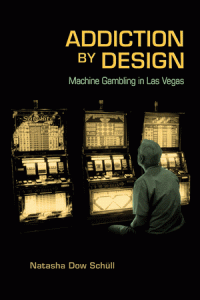 Click here to pre-order Schüll's forthcoming book, Addiction by Design
By Ronald J. Granieri, on Mon Jan 30, 2012 at 9:30 AM ET 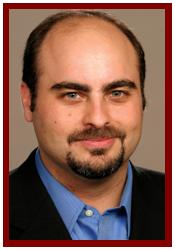 Ron Grainieri: Rebuttal #2 Ron Grainieri: Rebuttal #2
[The RP’s Provocation, Artur Davis’s Rebuttal #1]
Artur raises a crucial point, whether the money raised from gambling will really make that much of a difference, that I think deserves close attention.
As the proud product of parochial schools whose existence depended upon Bingo, I am well beyond worrying about the moral implications of using proceeds from vice to pursue virtuous ends. Considering how governments at various levels already derive revenue from other vices, such as tobacco and alcohol, as well as already existing lotteries, I view the moral debate on legalized and regulated gambling as forced and ultimately irrelevant. It is far too late for the brothel denizen known as the treasury to wish to regain its virginity.
I will say that I do not like the fact that the gambling industry has succeeded in re-christening (re-luciferizing?) itself as the “gaming” industry, which I consider a classic example of transparent mendacious marketing. It is supposed to make the activity appear somehow wholesome and entertaining, and to encourage us to avoid thinking about the whole, “most of the people who play lose their money” angle. Spare me. People play games like Missile Command (the greatest video game in the history of entertainment) for the fun of the game, and are happy to know that every quarter so spent is lost forever. Slot machines only exist because people are gambling on the hope of winning more money. To pretend otherwise is an insult to the intelligence of anything with a pulse.
By Artur Davis, on Mon Jan 30, 2012 at 9:00 AM ET  Artur Davis: Rebuttal #1 Artur Davis: Rebuttal #1
[The RP’s Provocation]
I think Jonathan makes the progressive case for gambling probably as well as I’ve seen it made–its a substantial upgrade from the libertarian boilerplate that gambling is a vice no loftier, no more shameful, than say, cigarette smoking, and that it’s not government’s job to regulate simple vice; its better than the “low wage casino jobs beat no jobs” spiel that drives progressives to embrace gambling in high unemployment communities. The fact is that government has been in the business of outlawing sin for a long time, particularly those of the addictive variety. Meanwhile, the jobs case for casinos falters on the ground that heavy gambling counties, especially in the Deep South, have unemployment rates equal to or worse than the gambling free zones next door to them; if anything, the casinos seem to chase a class of low end retail jobs from certain neighborhoods. Jonathan relies, instead, on a hard-core fact of politics: if raising taxes is untenable in most state capitals, and if massive service cuts are too draconian, gaming revenue is often the last option standing. If it sounds defeatist, its still proved powerful, and explains why conservatives in the Alabamas and Mississippis are torn over gambling, and rarely support banning it altogether, and why progressives are relatively untroubled by its regressive tendencies and the case that gaming dollars are a kind of extra sales tax on the poor.
So, without being an absolutist on the subject, I have two lingering doubts. One is that the gaming industry is a grossly inefficient market that uses its political clout to remain that way. In Alabama, rather than gravitate toward tourist destinations like the Gulf Coast, or the populous cities that could supply a steady labor base, it has concentrated in low end communities off the beaten path that have a much weaker core of employable adults. Even some of the communities that desperately want casinos struggle to get them or keep them. Ordinary rules of supply and demand don’t exist, and that means, invariably, that influence is be exercised to block some operators and to protect others. Its a lucrative prescription for corruption, and not surprisingly, the industry’s major benefactors found their way into a major, bipartisan public corruption prosecution last year.
Read the rest of…
The RPs Debate Gambling: Artur Davis Rebuts
By Jonathan Miller, on Mon Jan 30, 2012 at 8:30 AM ET Over the past three weeks, we’ve launched a new tradition at The Recovering Politician: a great virtual debate on the issues of the day among our recovering politicians; with provocations, rebuttals, responses, and defenses. Our first discussion focused on presidential leadership; our second on legalizing marijuana; and our third, Tim Tebow.
This week, the RP stirs up the mix with another controversial subject: the morality of gambling The RP starts off with his provocative article from The Huffington Post. Tune in every half hour to read what other RPs have to say.
SPOILER ALERT: There will be fireworks.
The RP‘s Provocation:
It was one of those awkward, seemingly-endless moments that elicited pained winces from both secular liberals and those of us who believe that prayer is a sacred communication with God.
Rev. Hershael York stepped up to the Speaker’s lectern, before a televised joint session of the Kentucky General Assembly, purportedly to deliver the opening prayer. Instead, he launched into a blistering political diatribe, attacking Gov. Steve Beshear’s signature proposal to generate tax revenue by expanding gaming in the Commonwealth:
May [the Legislature] never resort to leveraging vice and avarice to pay our bills… May they not lead this state to share profits from an industry that preys on greed or desperation. Help us to foster salaries, not slot machines, to build cars and enable jobs, not license casinos and seduce the simple into losing what they have.
While York’s oration was as inappropriate as it was unsubtle, it certainly reflected a widely-shared worldview within the conservative Christian community: Gambling is immoral, and its creeping sprawl through Middle America should be contained.
Read the rest of…
The RPs Debate Gambling: The RP Provokes
By Jonathan Miller, on Mon Jan 23, 2012 at 4:30 PM ET 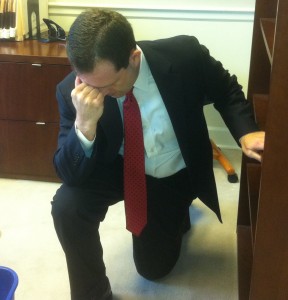 The RP‘s Closing Argument The RP‘s Closing Argument
[The RP’s Provocation; Artur Davis’ Rebuttal #1; Rod Jetton’s Rebuttal #2; John Y. Brown, III’s Rebuttal #3; Ron Granieri’s Rebuttal #4; Robert Kahne’s Rebuttal #5; Artur Davis’ First Response; Michael Steele’s Rebuttal #6; The RP’s First Defense; David Host’s Rebuttal #7; Zack Adams’ Rebuttal #8; Artur Davis’ Second Response; Rod Jetton’s First Response; Ron Crandall’s Rebuttal #9; Jason Grill’s Rebuttal #10]
In the long, storied history of the RP Great Debates (OK, it’s only been three weeks…), we’ve never had so many participants and so many opinions. There is something about Tim Tebow that certainly strikes a chord in so many Americans.
But to conclude where I began, the civility and positivity that Tim Tebow has added to the public dialogue is remarkable, particularly considering the hostility of some of his supporters and his detractors. And what’s even more remarkable is that the kid is only 24 years old! To be the idol of of millions and the devil to others, and to still retain such a modicum of humility is truly admirable.
Read the rest of…
The RPs Debate Tim Tebow: The RP’s Closing Argument
By Jason Grill, on Mon Jan 23, 2012 at 4:00 PM ET 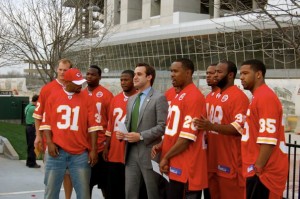 Jason Grill: Rebuttal #10 Jason Grill: Rebuttal #10
[The RP’s Provocation; Artur Davis’ Rebuttal #1; Rod Jetton’s Rebuttal #2; John Y. Brown, III’s Rebuttal #3; Ron Granieri’s Rebuttal #4; Robert Kahne’s Rebuttal #5; Artur Davis’ First Response; Michael Steele’s Rebuttal #6; The RP’s First Defense; David Host’s Rebuttal #7; Zack Adams’ Rebuttal #8; Artur Davis’ Second Response; Rod Jetton’s First Response; Ron Crandall’s Rebuttal #9]
Looks like this issue has almost been completely hashed out. Interesting responses and creativity throughout this entire debate on the RP.
Now, since I am charged with the late two-minute drill, let’s talk football:
Is it Tebow Time?
The Facts…
The Great: Career College Passing: 661 Cmp, 995 Att, 9285 Yds, 88 TD. Career College Rushing: 692 Att, 2947 Yds, 4.3 Avg, 57 TD, Heisman Award Winner (2007), BCS National Championship Winner (2007, 2009), 1st round NFL draft pick.
The Good: 8-6 as an NFL starting QB and 1-1 in the NFL playoffs.
The Bad: 18th QB scoring in Fantasy Football in 2011 (This is important to millions including me), ranked 32nd QB in passing yards (1,729), ranked 28th QB in overall rating (72.9), and ranked 34th QB in completion % (46.5) in 2011.
Tim Tebow is one of the best college QB’s of all time, but he is a below average NFL QB. Tebow will only continue to have a winning record in the NFL if his team’s running game and defense are great. In 2011, Denver finished 4th in the NFL in rushing and 6th in total defense.
Read the rest of…
The RPs Debate Tim Tebow: Jason Grill Rebuts
By RP Nation, on Mon Jan 23, 2012 at 3:30 PM ET  Ron Crandall: Rebuttal #9 Ron Crandall: Rebuttal #9The author is the Professor Emeritus and former Dean of the E. Stanley Jones School of World Mission and Evangelism at Asbury Theological Seminary
Thanks for the word on Tim Tebow (nice pose by the way–keep it up).
I think one of the things that people misunderstand about the John 3:16 scripture is the meaning of “eternal life.”
The tendency is to see it as something that starts when we die. Rather, Jesus clarifies it in John 17:3 when praying for us he says, “And this is eternal life, that they might know you, the only true God, and Jesus Christ whom you have sent.”
Tim has already discovered that life, as have others of us. It’s now. God’s desire for us all is not just to get us into heaven, but to get heaven into us.
By Rod Jetton, on Mon Jan 23, 2012 at 3:00 PM ET 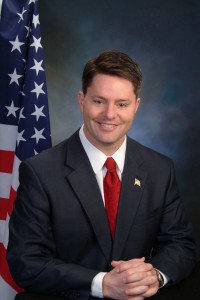 Rod Jetton’s First Response Rod Jetton’s First Response
[The RP’s Provocation; Artur Davis’ Rebuttal #1; Rod Jetton’s Rebuttal #2; John Y. Brown, III’s Rebuttal #3; Ron Granieri’s Rebuttal #4; Robert Kahne’s Rebuttal #5; Artur Davis’ First Response; Michael Steele’s Rebuttal #6; The RP’s First Defense; David Host’s Rebuttal #7; Zack Adams’ Rebuttal #8; Artur Davis’ Second Response]
While Jonathan is right that we can’t say with certainty when a fetus is a life, science is finding out that a fetus is viable at a younger and younger date with each new medical advance. I had a very good progressive female friend who was strongly pro-choice and would debate the subject with me vigorously. After she was married and decided to have children she had a sonogram.
She had a photo of a hardly recognizable fetus and she pointed it’s heart out to me. She stopped drinking, took extra vitamins and lived the healthiest lifestyle I had ever seen her live.
I didn’t bring it up, but she told me the whole pregnancy experience had made her think about abortion in a whole new way. She still believed a women had a right to control her own body, but the thought that that fetus might be a living person who could survive caused her to re-evaluate her position.
Read the rest of…
The RPs Debate Tim Tebow: Rod Jetton Responds
By Artur Davis, on Mon Jan 23, 2012 at 2:30 PM ET  Artur Davis‘ Second Response Artur Davis‘ Second Response
[The RP’s Provocation; Artur Davis’ Rebuttal #1; Rod Jetton’s Rebuttal #2; John Y. Brown, III’s Rebuttal #3; Ron Granieri’s Rebuttal #4; Robert Kahne’s Rebuttal #5; Artur Davis’ First Response; Michael Steele’s Rebuttal #6; The RP’s First Defense; David Host’s Rebuttal #7; Zack Adams’ Rebuttal #8]
He underscores why Tebow’s brand of religiosity has lasting political relevance. The Focus on the Family ad is so effective because it attacks the pro-choice movement in one of its strongest places–abortions related to medical risks for the mother or fetus. Typically, the pro-life cause has dodged this line of attack in favor of a focus on abortions as a fallback when birth control fails, or abortions deep in the third trimester.
That the ad works so well, that it did not even strike many of its viewers as intensely political or even anti-choice, is an adman’s dream. And that’s no slight to Tebow or his mother; its actually a nod to the power of their testimony. But as Zack Adams appreciates, the ad is an argument for restricting or even criminalizing a different choice than Mrs. Tebow made. It’s not a plea for compromise; its a plea for codifying the value of unborn life even in the most morally complex, scientifically ambiguous context. With r espect to Jonathan, calling it something less than that probably understates what the Tebows and Focus on the Family meant to say.
Read the rest of…
The RPs Debate Tim Tebow: Artur Davis Responds
|
The Recovering Politician Bookstore
|















